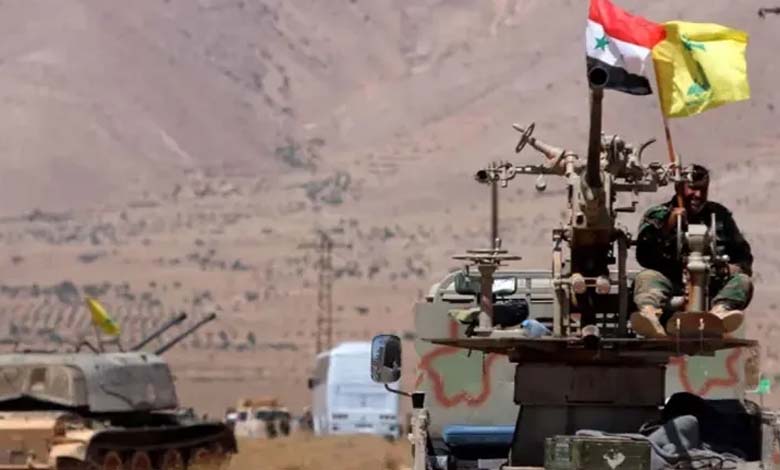Iran evacuates sites in Syria in anticipation of Israeli attack
Iranian authorities are sending multiple messages to the United States to confirm their commitment to not escalate tensions in the Middle East with Israel

The American newspaper “Wall Street Journal” reported on Thursday that Iran has begun evacuating its personnel from sites in Syria, anticipating an Israeli response following its attack on Saturday against Israel in retaliation for a bombing of one of its diplomatic buildings in Damascus in early April, despite regional and international calls to ease tensions and contain a war in the Middle East whose consequences are expected to be devastating.
According to the newspaper, “Iran is preparing for an Israeli retaliatory attack on its territory or on its proxies,” including Hezbollah in southern Lebanon.
It added that this is happening “while the United States and European countries are pressuring Israel for a response that prevents the escalation of tensions following Tehran’s missile and drone attack last weekend.”
The newspaper quoted Syrian and Iranian officials and advisers as saying, “Tehran has also begun evacuating its personnel from sites in Syria where the Iranian Revolutionary Guard is heavily present.”
In response to threats made by Prime Minister Benjamin Netanyahu to retaliate against an attack carried out by the Revolutionary Guard and its allies against Israel with hundreds of drones and missiles, Iranian Foreign Minister Hossein Amir Abdollahian said that his country had sent “several” messages to the United States to assure that Iran “is not seeking to escalate tensions” in the Middle East with Israel, according to his ministry on Thursday.
Abdollahian said upon his arrival Wednesday night in New York to attend a meeting of the United Nations Security Council that “what could exacerbate tensions in the region is the behavior of the Zionist regime.”
Israel said on Wednesday that it reserves “the right to protect itself” against Iran, following the attack by the Islamic Republic last Saturday on its territory with drones and missiles.
The Iranian minister insisted that there were “messages sent before and after” the operation to the United States, especially through the Swiss embassy in Tehran, which represents American interests in Iran in the absence of diplomatic relations between the two countries, explaining that the goal was “to arrive at a correct understanding of Iran’s actions.”
“We have clearly told the Americans that the decision… to retaliate against the Israeli regime,” following the strike attributed to Israel against the Iranian consulate in Damascus in early April, “was final.”
He added: “We tried to clarify to the United States in these messages that we are not seeking to escalate tensions in the region.”
He is expected to meet in New York with UN Secretary-General Antonio Guterres and other foreign ministers on the sidelines of the Security Council meeting to discuss the Palestinian Authority’s request for full membership in the United Nations.
On Wednesday, Iranian President Ibrahim Raisi said that his country’s response to Israel was “limited and punitive” and threatened Tel Aviv with dealing “strongly and firmly” if it launches any attack on Iranian soil.
Also on Wednesday, Admiral Shahram Irani, commander of the Iranian navy, said that a naval escort would accompany his country’s commercial ships to the Red Sea as part of its preparations for an expected Israeli retaliation.
The Hebrew broadcasting authority said on Thursday that opinions remain divided among Israeli leaders on the nature of the response to Iran after its attack on Israel on Saturday in retaliation for an alleged Israeli bombing of its consulate in Damascus early this April.
The authority quoted an unnamed Israeli source as saying, “Israel will find it difficult to carry out a response to the Iranian attack in the original form that had been planned and approved by the government,” on Saturday night and Sunday morning. The authority did not specify the nature of this response approved by the government and its method of execution, but said, “The prime minister decided to wait for a conversation with US President Joe Biden on the matter and the response will not be as planned, political sensitivity has increased.”
The authority added: “There will be a response, but it will likely be different from what was planned and different from what should have been done immediately after the Iranian attack on Saturday night and Sunday morning.”
The authority said: “As part of the pressure on Israel to avoid an unusual response, diplomats after speaking with high-level Israeli officials said no one can guarantee that we will be able to prevent the next Iranian attack by 100 percent.”
Israel had previously announced that several countries, including the United States, Britain, and France, had participated in repelling the Iranian attack with missiles and drones.
In this regard, the broadcasting authority reported that unnamed Western diplomats said: “The understanding (with the West) is that Israel will respond, and the question is how to ensure that the response will not lead to widespread escalation.”
The authority said: “Netanyahu was advised to attack sensitive facilities in Iran in response to Saturday’s attack.”
It noted that “opinions still diverge within the Israeli leadership on this issue,” adding that most decision-makers believe that a response must be made as soon as possible,” according to a senior Israeli government official, “with each passing day, the chances of a major retaliatory strike in Iran diminish.”
However, it pointed out that “at the same time, there is international pressure on Israel to avoid taking marked escalation steps that could lead the region into a full-scale war between Israel and Iran.”
It also quoted an unnamed European diplomat as saying, “Europe is prepared to go far in terms of imposing sanctions on Iran.”












